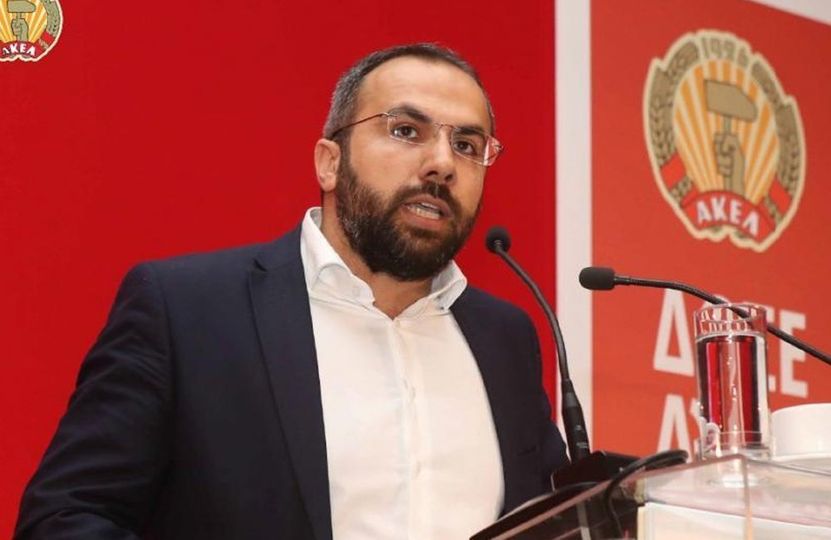The substantive improvement in relations between Greece and Turkey can have positive effects…
Interview with Giorgos Koukoumas, member of the C.C. of AKEL and AKEL C.C. Spokesperson
Sunday 2 April 2023, “Haravgi: newspaper
QUESTION: How do you assess the government’s disagreement with the Greek government’s decision to support Turkey’s membership of the International Maritime Organization?
GK: This agreement between Greece and Turkey is a sovereign right of both countries. It is an internal matter for Greece to evaluate the agreement and it goes without saying that Cyprus is not bound by it. Of course, the position on the part of Cyprus could have been worded differently. That is to say: if Turkey wanted the vote of the Republic of Cyprus for its candidacy to the International Maritime Organisation, then it should have made similar concessions to the Republic of Cyprus as well.
QUESTION: In recent weeks we have seen an improvement in relations between Greece and Turkey. Can this rapprochement help towards finding a solution to the Cyprus problem?
GK: The improvement of Greek-Turkish relations through the peaceful resolution of problems on the basis of international law and the respect for the principles of good neighbourliness can only be positive for both countries. This is the way to put an end to the tension, militarization, the questioning of borders and sovereign rights of Greece on the part of the Turkish state, elements that feed each other’s nationalisms and create space for foreign interventions. After all, nothing separates the peoples of Greece and Turkey. A substantial improvement in relations between Greece and Turkey can have a positive impact on the wider Eastern Mediterranean region.
On a second level, it can also have a positive effect on the general climate surrounding the Cyprus problem. However, it should be clear that what will decide the fate of the Cyprus problem is something very specific: that is to say, whether we will be able to return to the negotiations, from the point where they were interrupted in 2017 [at Crans Montana], on the basis of the Guterres Framework and all the convergences that had been recorded so far in the negotiations, with the aim of reaching a comprehensive solution of the Cyprus problem on the agreed basis and framework.
QUESTION: Concerns about a new banking crisis are strong. Should prompt plans be made to provide support to vulnerable groups in the event of a crisis?
GK: AKEL has already demanded that the impact on the Cyprus economy of the recent developments observed in the global banking system should be discussed as an ex-officio issue in the Parliamentary Finance Committee, in order to be briefed on the real extent of exposure of banks and businesses.
The situation has certainly been difficult for some time, not only for vulnerable groups but for the vast majority of society, which is being squeezed by rising inflation, tha lack of housing, low wages and the threat of foreclosures. Bearing in mind, moreover, that while all this is going on internationally and domestically, the banks in Cyprus are recording huge super profits. According to ECB figures, banks in Cyprus have perhaps the highest profit margin across the entire Eurozone in terms of interest rates.
At the same time, the banks and loan acquisition companies are becoming more and more ruthless against borrowers every day, since the foreclosures were “unfreezed” by the votes of DISY, DIKO and DIPA along with the abstention of EDEK party. They refuse in many cases to discuss loan restructuring.
In addition, with the successive increases in interest rates, it is expected that even more people will not be able to pay their instalments. And all this, while a legislative framework for foreclosures continues to exist that scandalously and illegally favours banks at the expense of borrowers. In other words, unprecedented profits for the banks, suffocation for the people.
What is therefore required is for the government to elaborate a targeted interest rate subsidy scheme for the middle and lower strata and at the same time ensure that small and medium enterprises have access to sustainable credit. In addition, tools such as the Central Bank Code and the targeted extension of the repayment period of loans should be utilised, while with regards the framework for foreclosures, it is absolutely necessary that AKEL’s proposals which are pending in the Finance Committee are voted on, which aim to restore a relative balance between banks and borrowers.
The substantive improvement in relations between Greece and Turkey can have positive effects





